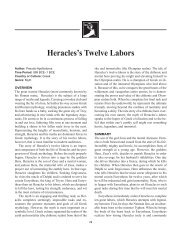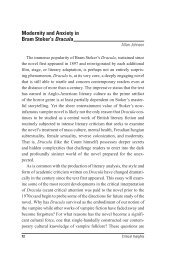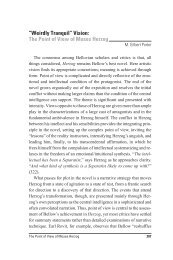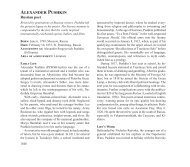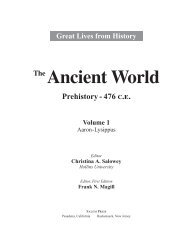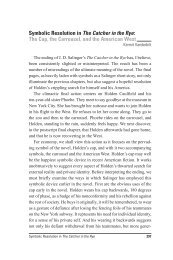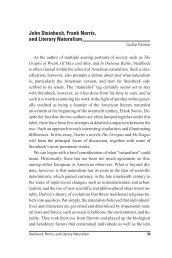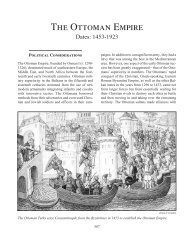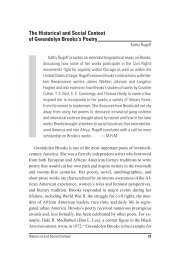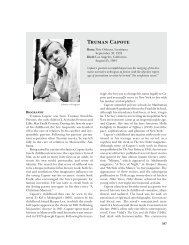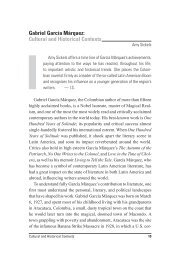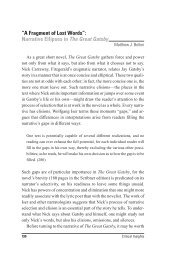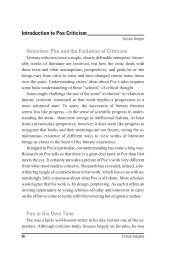NAACP. See National Association for the Advancement - Salem Press
NAACP. See National Association for the Advancement - Salem Press
NAACP. See National Association for the Advancement - Salem Press
Create successful ePaper yourself
Turn your PDF publications into a flip-book with our unique Google optimized e-Paper software.
660 ■ Nation of Islam The Thirties in America<br />
Europeans, and African Americans. Later editions<br />
attempted to correct <strong>the</strong>se problems, while making<br />
Nancy more conventional, if less interesting. Collectors<br />
prefer <strong>the</strong> original volumes. Nancy’s adventures<br />
in River Heights helped readers escape <strong>the</strong> deprivations<br />
of <strong>the</strong> Depression and rumors of war. The fact<br />
that teachers and librarians found <strong>the</strong> books objectionable<br />
only added to <strong>the</strong>ir popularity. Nancy enabled<br />
young girls to believe <strong>the</strong>y too could lead lives<br />
of achievement and adventure. Among <strong>the</strong> many accomplished<br />
women who have acknowledged <strong>the</strong><br />
early influence of Nancy Drew are politician Hillary<br />
Clinton, opera singer Beverly Sills, television journalist<br />
Barbara Walters, <strong>for</strong>mer First Lady Laura<br />
Bush, and <strong>the</strong> first three women appointed to <strong>the</strong><br />
U.S. Supreme Court.<br />
Allene Phy-Olsen<br />
Fur<strong>the</strong>r Reading<br />
Mason, Bobbie Ann. The Girl Sleuth: A Feminist Guide.<br />
Old Westbury, N.Y.: The Feminist <strong>Press</strong>, 1975.<br />
Plunkett-Powell, Karen. The Nancy Drew Scrapbook.<br />
New York: St. Martin’s <strong>Press</strong>, 1993.<br />
Rehak, Melanie. Girl Sleuth: Nancy Drew and <strong>the</strong><br />
Women Who Created Her. New York: Harcourt, 2005.<br />
<strong>See</strong> also African Americans; Anti-Semitism; Great<br />
Depression in <strong>the</strong> United States; Literature in <strong>the</strong><br />
United States; Recreation.<br />
■<br />
Identification American-based Muslim religious<br />
organization<br />
Date Founded in July, 1930<br />
Place Detroit, Michigan<br />
Established during a period of African American migration<br />
out of <strong>the</strong> South and growing economic disparities between<br />
<strong>the</strong> races, worsened by <strong>the</strong> Great Depression, <strong>the</strong> Nation<br />
of Islam represents an important strain of African<br />
American nationalism. It served <strong>the</strong> religious and political<br />
needs of many African Americans during <strong>the</strong> 1930’s by espousing<br />
freedom and justice <strong>for</strong> black people, and it would<br />
become one of <strong>the</strong> most important African American institutions<br />
in later decades as well.<br />
The exact beginnings of <strong>the</strong> Nation of Islam (adherents<br />
call <strong>the</strong>mselves Muslims) are not clearly recorded.<br />
The founder, Wallace Dodd Fard (also<br />
known as Wallace Fard Muhammad), spread word of<br />
his variant of Islam through door-to-door sales in Detroit<br />
among dispossessed blacks, beginning in July,<br />
1930. Fard initially used <strong>the</strong> Bible to teach about Islam<br />
as <strong>the</strong> religion of black people in Asia and Africa,<br />
and eventually he introduced followers to <strong>the</strong><br />
Qur$3n, <strong>the</strong> holy book of Islam. At its inception, <strong>the</strong><br />
Nation of Islam held religious meetings in private<br />
homes. Within three years, as a result of <strong>the</strong> religion’s<br />
rapid growth, Fard was holding temple meetings<br />
in a hall and had established Muslim schools <strong>for</strong><br />
children in Detroit.<br />
Mainstream Muslims regard <strong>the</strong> Nation of Islam<br />
as a separatist Islamic sect. Fard’s religious doctrines<br />
were heavily infused with racial ideologies (though<br />
<strong>the</strong> exact racial lineage of Fard himself remains debated<br />
and unknown). Among its tenets, <strong>the</strong> Nation<br />
of Islam teaches that black people are <strong>the</strong> original<br />
humans and Caucasians <strong>the</strong> result of <strong>the</strong> workings of<br />
a mad scientist named Yakub. Likened to “devils,”<br />
white people, <strong>the</strong> Nation of Islam argued, were inferior<br />
to black people. Shortly after its founding, <strong>the</strong><br />
Nation of Islam attracted controversy <strong>for</strong> some of its<br />
more inflammatory racial teachings. Fard taught his<br />
followers that one could be ensured salvation<br />
through Mecca by sacrificing (murdering) four<br />
“white devils.” In 1932 and 1933, <strong>the</strong> Nation of Islam<br />
attracted much attention from <strong>the</strong> Detroit police<br />
over this tenet, and rumors of at least one sacrifice<br />
persist to this day, though <strong>the</strong> tenet is omitted from<br />
modern teachings.<br />
Fard disappeared from <strong>the</strong> organization sometime<br />
during 1933 or 1934. Speculation arose that he<br />
had been murdered. Historians have deemed this<br />
unlikely, but stories have circulated about his subsequent<br />
whereabouts <strong>for</strong> decades. Since 1931, Fard<br />
had been grooming a convert, Elijah Poole (who<br />
later was given a Muslim name, Elijah Muhammad),<br />
<strong>for</strong> ministry in <strong>the</strong> Nation of Islam. After Fard’s<br />
disappearance, Muhammad continued to preach<br />
throughout <strong>the</strong> United States, predominantly in <strong>the</strong><br />
North and in Washington, D.C., proselytizing according<br />
to <strong>the</strong> doctrine he had learned from Fard.<br />
These messages were passed down in written <strong>for</strong>m in<br />
The Supreme Wisdom (1957) and included <strong>the</strong> belief<br />
in one god (Allah), <strong>the</strong> holy Qur$3n, and <strong>the</strong> Bible.<br />
The Nation of Islam experienced internal fractures<br />
during this time and was threatened by outside attempts<br />
to weaken <strong>the</strong> organization, including ef<strong>for</strong>ts<br />
from <strong>the</strong> Communist Party USA and <strong>the</strong> Japanese.



